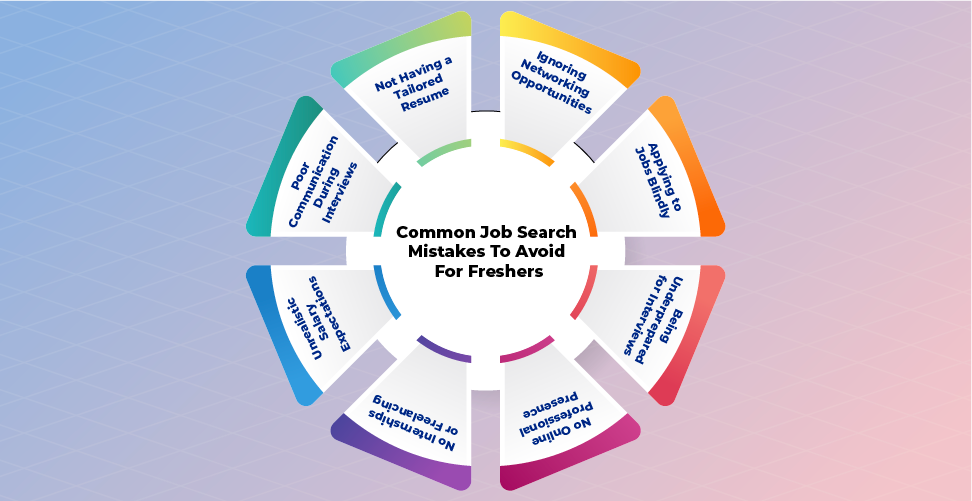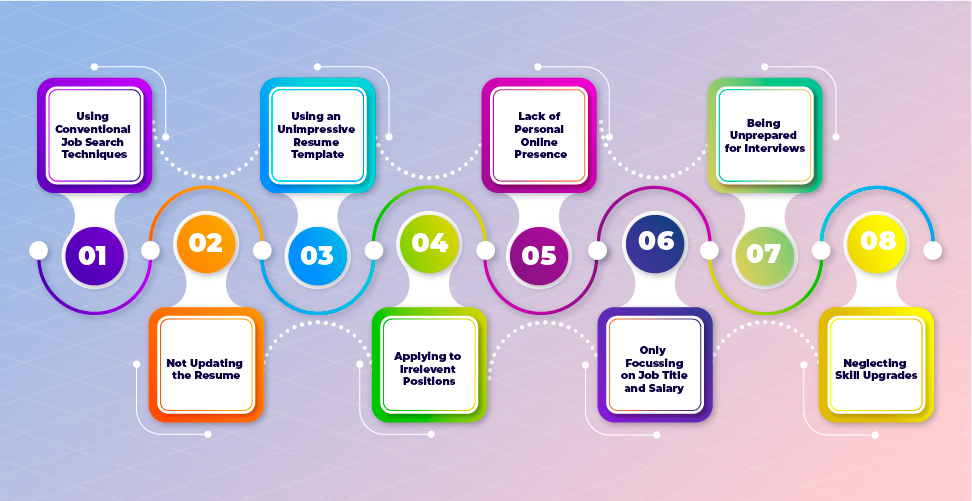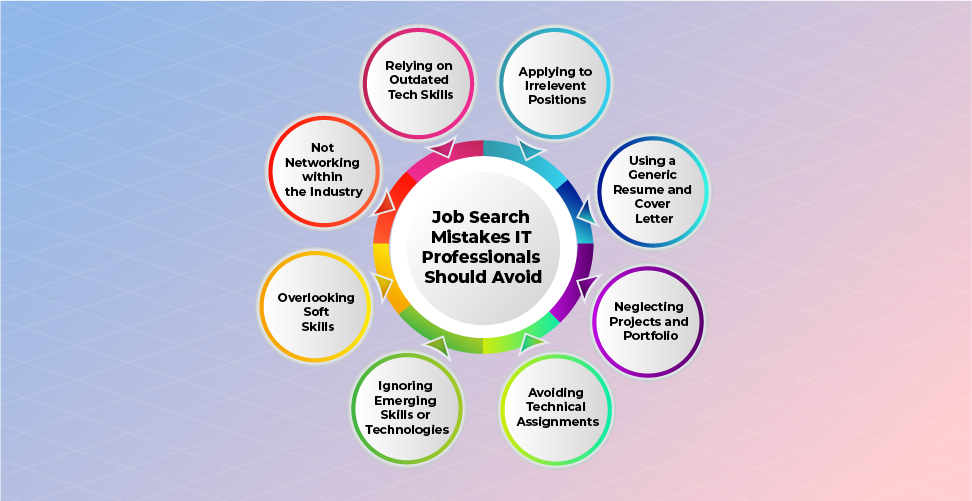Table of Contents
ToggleIntroduction
Fierce competition and high stakes in the job market can make job search very tiring and equally frustrating. Freshers and experienced individuals often feel lost while looking for jobs. Finding a good job has become so competitive that many refer to it as job hunting rather than job search. Experts believe that regardless of your industry expertise, seniority, and designation, finding your first or next job search can become a directionless activity with very few productive results if you don’t have strategies for your job search. In this blog, let’s evaluate the top job search mistakes and ways to avoid them so that your job search journey is seamless and successful.

Don't miss out on your chance to work with the best
Apply for top global job opportunities today!
Common Job Search Mistakes To Avoid For Freshers

Not Having a Tailored Resume
- Mistake: Freshers often misunderstand that beginners can find a good job with a generic resume. One should not use the same resume for multiple roles or different departments.
- Useful Tip: Always customize your resume to match the job description. Highlight relevant skills or coursework that align with the role.
Ignoring Networking Opportunities
- Mistake: Another mistake is using just job portals to find a job.
- Useful Tip: Connect with alumni, attend industry events, or join LinkedIn groups related to your field to access opportunities and build relationships.
Applying to Jobs Blindly
- Mistake: Freshers start sending out resumes to a high number of positions. This can reduce your chances of standing out.
- Useful Tip: Even though you may be a fresher, limit your applications to roles that match your skills. Also, do not forget to send a cover letter with each application.
Being Underprepared for Interviews
- Mistake: Going into an interview without knowledge of the company or role can reflect poorly.
- Useful tip: Research the company’s values, recent projects, and competitive landscape to show enthusiasm and insight.
No Online Professional Presence
- Mistake: Many freshers misunderstand that freshers cannot have an online profile because they don’t have any experience or learning to share.
- Useful tip: Create a LinkedIn profile and a clean social media presence, even if you are a fresher. Your LinkedIn should be up-to-date and demonstrate your education, projects, and internships. Make sure you adjust privacy settings on other accounts as needed.
No Internships or Freelancing
- Mistake: Freshers focus solely on finding a full-time job after completing their degree or certification without considering internships, freelance projects, or temporary positions.
- Useful tip: Freelance projects and internships build your portfolio, enhance your skills, and often lead to full-time opportunities.
Unrealistic Salary Expectations
- Mistake: Lack of industry knowledge can lead to freshers having unrealistic salary expectations. This might cause candidature rejections at job interviews.
- Useful tip: Research entry-level salaries on platforms like Glassdoor or LinkedIn to understand what’s typical for your role and location.
Poor Communication During Interviews
- Mistake: Many job applicants feel that only submitting a resume that outlines their degrees and certifications is enough. An applicant from a leading institute can be rejected if they cannot talk properly during interviews. It could result in misunderstandings, leaving hiring managers unsure of an applicant’s skills, experience, or fit for the role.
- Useful tip: Building good communication skills is crucial for acing virtual interviews and in-person ones, as it helps applicants express their thoughts clearly. One should also be able to explain technical concepts clearly and provide specific examples.
Common Job Search Mistakes the Experienced Should Avoid

Using Conventional Job Search Techniques
- Networking and personal branding have evolved. Experienced professionals should utilize LinkedIn and social media platforms, attend industry events, and engage in professional groups in addition to applying directly for jobs. This helps them stay visible and connect with potential employers.
Not Updating the Resume
- Experienced professionals make the mistake of assuming that their experience speaks for itself. However, it’s crucial to tailor your resume to the role you are applying for. A useful tip highlights achievements, skills, and experiences most relevant to the job. This can ensure your resume reflects current trends and keywords.
Using an Unimpressive Resume Template
- Hiring managers may quickly dismiss a bland, cluttered resume. A generic or poorly designed resume template fails to capture attention or highlight your career transitions. Experienced applicants should use a clean, professional template that is applicant tracking system (ATS) friendly. The content should be easy to read and emphasize the key achievements and skills at the top to create a solid first impression.
Applying to Irrelevent Positions
- While it could lead to a lesson for freshers when they apply to random positions, it could cost experienced professionals a good opportunity. It would come across as highly unprofessional if experienced individuals were to send out their resumes to positions that don’t match their skills and experience. It is important to invest time in scanning and filtering job vacancies so that you only apply to positions that fit you.
Lack of Personal Online Presence
- It is not enough for experienced applicants to just find a job based on their CV, no matter how detailed it is. For seasoned professionals, maintaining a professional digital presence is vital. Update your LinkedIn profile, share industry insights, and demonstrate thought leadership in your field to showcase expertise and attract recruiters.
Only Focussing on Job Title and Salary
- It is natural to aspire for a high salary and a specific title as you gain professional experience. However, a disadvantage is that it limits their options. Experienced professionals should focus on roles that offer career growth, align with their skill set, and have cultural fit, even if titles or compensation differ slightly.
Being Unprepared for Interviews
- You must not overlook interview prep, even if you are an experienced professional. It is foolish to assume that your experience alone will carry you ahead. Regardless of your years of experience, always research the company, prepare to discuss recent achievements, and practice articulating how your skills can add value to the new role.
Neglecting Skill Upgrades
- The job market is rapidly evolving, and employers seek professionals with current skills. Experienced professionals who take relevant courses, earn certifications, and engage in upskilling opportunities have a better chance of staying relevant in the job market.
Must Read: Building a Personal Brand for Career Success
Job Search Mistakes IT Professionals Should Avoid

Relying on Outdated Tech Skills
- Sticking to outdated tech stacks or avoiding new programming languages can limit your job prospects. IT professionals should regularly update their skill sets to include relevant frameworks, languages, and tools that are in demand.
Applying to Irrelevent Positions
- When applicants do not match a role’s requirements, it shows a lack of focus or understanding of the industry. Applying to irrelevant positions can negatively impact IT professionals by wasting time, misaligning expectations, and leaving a poor impression on hiring managers. Professionals should tailor their applications to positions that closely align with their skills and experience, ensuring a better fit and increasing their chances of progressing through the hiring process.
Using a Generic Resume and Cover Letter
- One cannot emphasize enough how important it is to customize your resume and cover letter to the job description. The resume and cover letter of an IT applicant or a developer should be tailored to highlight the skills and experiences that align with each specific position you apply for to make a stronger impact.
Neglecting Projects and Portfolio
- Unlike other fields, IT roles often require tangible evidence of skill. A strong GitHub portfolio, personal website, or project showcase can significantly increase your attractiveness to employers by demonstrating hands-on experience.
Avoiding Technical Assignments
- Many IT and Development roles require applicants to clear a technical stage where candidates are given assessments. IT professionals should not skip or refuse this stage, as it is included in the interview process to evaluate your technical expertise.
Ignoring Emerging Skills or Technologies
- Tech and development fields evolve quickly, so staying current is vital. Continuous learning is a key to staying relevant in any field. IT professionals should mention recent certifications, courses, or technologies they have learned in their resumes. This demonstrates their commitment to professional growth.
Overlooking Soft Skills
- You might have years of experience fixing bugs and building innovative solutions, but if you cannot communicate properly, it might become a roadblock in your career progression. While tech skills are crucial, IT roles increasingly value soft skills such as communication, teamwork, and problem-solving. Highlighting examples of these abilities on your resume and during interviews can set you apart from other technically skilled candidates.
Not Networking within the Industry
- Attending meetups, conferences, or tech networking events can lead to connections that may open job opportunities. LinkedIn, GitHub, and online tech communities are great places to network and gain visibility in the industry.
Wrapping Up
Fierce competition can make job seekers feel that the hiring industry is unkind and too demanding. However, the truth is that industry standards upgrade only when employees show remarkable talent and skills. So the first thing to do is to stop worrying if you are not getting THE job you want. Then, evaluate your years of experience and skill set based on what jobs are being offered by the industry. Further, revise, upgrade, and relaunch yourself in the professional field. It doesn’t matter if you are a fresher, mid-level, or senior professional. This blog on mistakes to avoid in your job search will help you take a proactive approach to highlight your skills and adaptability so that you can improve your job search outcomes significantly. While you are here, sign up with Olibr now to get a good headstart on your job search.
Take control of your career and land your dream job
Sign up with us now and start applying for the best opportunities!


